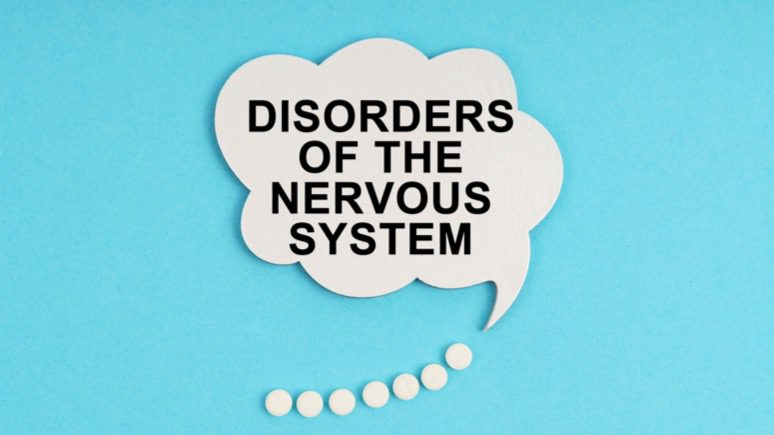The concept of nervous system disorders involves a range of conditions that can be triggered by secondary factors or may be chronic. The nervous system is a complex, intelligent system controlling and coordinating body activities. The nervous system is divided into the central nervous system (the brain and spinal cord) and the peripheral nervous system (all other neural elements).
Types of nervous system disorders
- Vascular disorders, including transient ischemic attack (TIA), subdural hemorrhage, stroke, hematoma, subarachnoid hemorrhage, or extradural hemorrhage
- Structural disorders, such as carpal tunnel syndrome, injury of the brain or spinal cord, cervical spondylosis, peripheral neuropathy, brain and spinal cord tumors, Bell’s palsy, and Guillain-Barré syndrome
- Degeneration, including multiple sclerosis, amyotrophic lateral sclerosis (ALS), Alzheimer’s disease, Parkinson’s disease, or Huntington’s disease
- Infections, such as polio, encephalitis, epidural abscess, and meningitis
- Functional disorders, such as headache, dizziness, epilepsy, and neuralgia
Nervous system disorders symptoms
Each individual will experience symptoms of the nervous system disorder differently depending on the type of disorder, its cause, and overall health of the individual. Among the most common symptoms of nervous system disorders are the following:
- A headache that persists or develops suddenly
- Tingling or loss of feeling
- Changing or different headache
- Memory loss
- Lack of coordination
- Loss of muscle strength or weakness
- Seizures and tremors
- Slurred speech
- Muscle wasting
- Muscle rigidity
- Back pain radiating to the toes, feet, and other parts of the body
- Impaired mental ability
- Dimness, double vision, blurring, or loss of sight
- The onset of new language impairment (expression or comprehension)
- Dizziness
- An altered level of consciousness or behavior
- Trouble understanding speech
- Inability to move a portion or all of one side of the body
Nervous system disorders treatment
Nervous system disorders have a variety of symptoms and causes. That is why treatment will be individualized for each patient. Nervous system disorders treatment may involve medications, physical therapy, pain management, and surgery. Listed options can be prescribed alone or in combination. Additionally, certain hospitals offer patient support programs, such as Parkinson’s exercise classes, which can be helpful in allowing patients to return to normal activities.
Therapy for nervous system disorders treatment
- Speech therapy. Speech therapy (speech-language pathology) may help you if you have difficulties speaking or swallowing.
- Physical or occupational therapy. With the help of an occupational or physical therapist, you can improve your mobility and prevent complications. For instance, regular movement of legs or arms may prevent muscle tightness and weakness if you experience loss of mobility or paralysis. Moreover, your ability to function can be improved by a gradual increase in exercise.
- Stress reduction or distraction techniques. Progressive muscle relaxation, physical activity, and breathing exercises are examples of stress reduction techniques. You can distract yourself with music, talking to another person, or changing your walking or movement patterns deliberately.
Mental health therapy for functional disorders of the nervous system
Although functional neurological symptoms are not entirely mental, emotions and the way you perceive things can affect how you feel about them and how you recover. Psychiatric treatment options for functional disorders of the nervous system may include:
- Cognitive-behavioral therapy (CBT). It is a type of psychotherapy helping you become aware of and correct inaccurate or negative thinking so that you can perceive situations more clearly and react to them more effectively. Cognitive-behavioral therapy may also help you better manage stressful life situations and symptoms of the disease. CBT may be especially beneficial if you experience symptoms that include nonepileptic seizures. If you have interpersonal issues or a history of trauma or abuse, you may benefit from other types of psychotherapy.
- Treatment of other mental conditions. Symptoms of functional disorders of the nervous system can be worsened by depression, anxiety, or other mental health disorders. In addition to treating functional neurologic disorders, mental health problems treatment can aid recovery.
Nervous system disorders medications
Patients experiencing neurological issues can benefit from effective prescription and over-the-counter medications in addition to clinical care. Although not all neurological conditions respond to medication, many do, and it is rare to find a health care provider who overlooks such a valuable tool for managing neurological disorders.
Drug therapy is indicated more often than any other form of treatment for the following disorders:
- Seizure disorders
- Neuralgias and headaches
- Meningitis
- Facial palsy
- Movement disorders
- Cerebrovascular accidents
Medications are not effective for treating functional disorders of the nervous system, and no medicines are approved by the Health and Drug Administration as a particular treatment for this type of neurologic disorders. Antidepressants may be helpful, however, if you also have depression or another mental disorder or if you are experiencing pain or insomnia.
In addition, you can take the Khavinson peptide supplement called Cerluten to contribute to the activation of metabolic processes in the central nervous system (CNS) and slow down age-related changes in your nervous system. Cerluten is a natural peptide supplement aimed to restore and improve the nervous system by affecting neurons.
However, you should talk to your physician before taking any supplements.
Click here to read more about Cerluten.
















Leave a Reply
You must be logged in to post a comment.